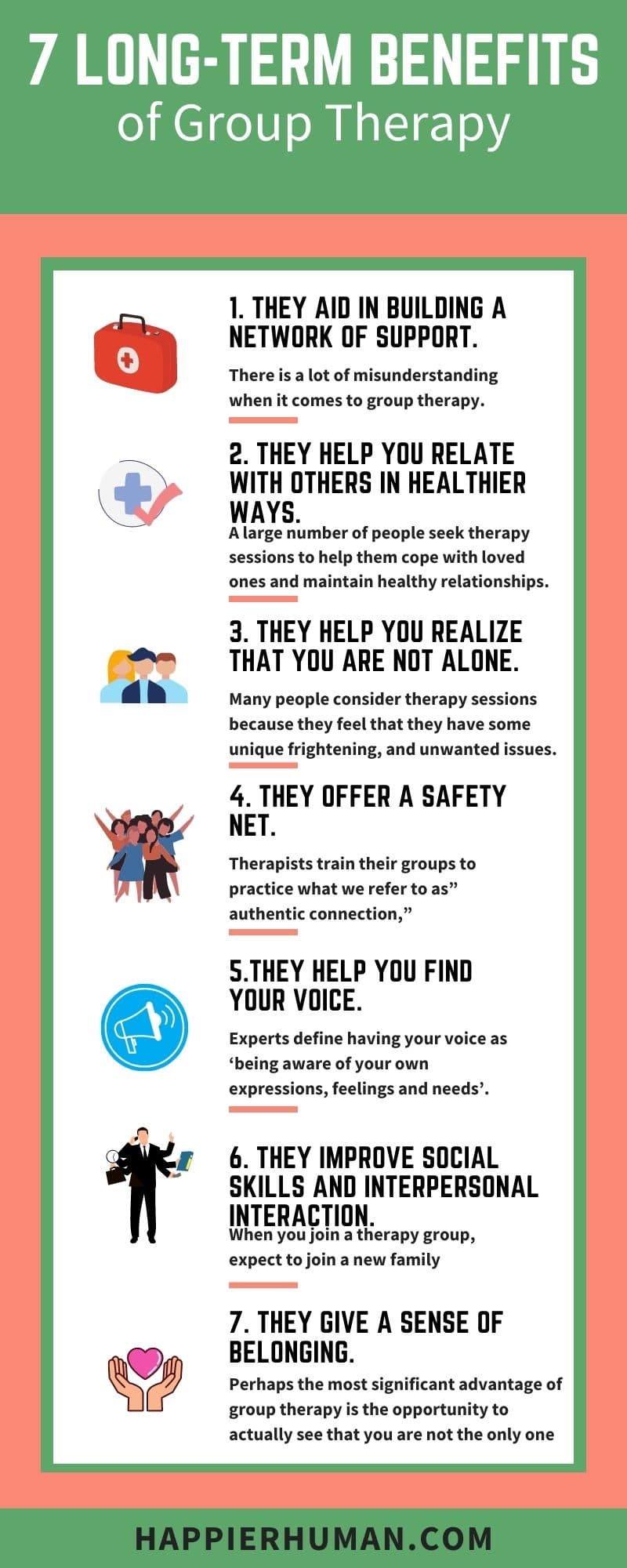Have you ever wondered if group therapy is right for you?
This might be a question you be asking – especially if you’re tired of the regular 1-on-1 therapy sessions that many people experience.
So if your therapist is the get-to-business kind, then you should seriously consider joining group psychotherapy.
Depending on the professional help you need, and the amount of time you will be taking these therapies, you want to ensure that you are as comfortable as possible to aid faster recovery.
At the same time, I get it; the mere imagination of sharing your therapy session with another person or other people may feel daunting and scary. Medical treatment around a group of strangers? No way!
But think of it this way. What if there are benefits? And yes, there are because, in this article, we will discuss seven long term benefits of group therapy, but before then, let's define group therapy.
What is Group Therapy?
Group therapy is a unique form of treatment where a group of individuals meet together under the guidance of a professional therapist. This form of treatment helps improve social connections and development skills while also assisting patients to recover faster.
A group could consist of 4 to 15 people and are led by a qualified facilitator who actively involves every member to ensure equal participation.
The leader can be a mental health professional, a psychologist, or a social worker who is trained to handle dynamic groups and focus on specific issues. Such sessions can be done once or twice a week, depending on the duration of the treatment.
Some groups focus on specific problems while others simply focus on developing social skills and helping individuals deal with social issues such as low self-esteem, loneliness, anger, and shyness. Of course, there is more to group therapy than a couple of people sitting down together.
Group therapies are meant to create a platform of the audience that will listen and hear you and help you understand that you are not the only one going through the same issue.
Now that you understand what group therapies are and how they work let's look at its longtime benefits.

7 Long-Term Benefits of Group Therapy
While group therapy is chained with a broad consensus of benefits, that doesn't mean that this form of treatment is better than individual therapy.
Group therapy also has its disadvantages, and that's why it is essential to speak to your therapist to give the best advice.
All forms of therapies are designed to treat you the best way possible. Remember, we are different people battling different issues, and healthcare professionals have to develop additional treatment plans to aid recovery. In simple terms, the whole point is to make sure you are well.
So now, let’s dive into the seven benefits of group therapy…
1. They aid in building a network of support.
There is a lot of misunderstanding when it comes to group therapy. Many people believe that group members take turns to receive individual therapy as others sit and listen, which is totally wrong and misleading.
The reason why you are put together as a group is to learn from each other, not listen to what the therapist has to say.
Members must encourage each other and turn to each other for feedback, support, and connection, instead of just getting everything from the clinician. You are in a better position to understand yourself when you relate to someone in the same situation.
It is the same principle teachers use to teach a concept that students don't get. If you can remember back in school, teachers used to select a few students to teach a concept because they believed you would understand better when you are guided by a fellow student. The idea? To make sure that you understand.
Therapy groups work the same way. Here is an example. One member feels lonely, isolated, and abandoned. He also doesn't know how to make friends. The group supports him by listening when he talks and ngaging him in conversations that clear the sense of isolation.
Members also share their experiences with the group and ways they can beat boredom, loneliness, and how to overcome isolation. They become your friends and a family that you can run to.
2. They help you relate with others in healthier ways.
A large number of people seek therapy sessions to help them cope with loved ones and maintain healthy relationships. What makes their situation even worse is that their family and friends do not tell them the truth because they fear hurting their feelings.
However, just because your relationship is not working doesn't mean you are the problem. Don't be too hard on yourself; sometimes it is the other party that could be the problem.

You also want to assess yourself and know where exactly the problem is coming from. That is where your group therapy comes in. Members who are dealing with the same problem as you can give you honest feedback and also provide solutions that worked for them.
They also understand you better because they have been there and will not alienate you like other people. All the members are likely strangers to you, which means they don't know you. This also means they will naturally develop an interest in knowing you better because you are in the same situation as them.
Therapists also encourage members to support each other's ways of relating. We don't all smile at a new face when we meet them, and not all of us appreciate meeting new people. Some prefer to play dumb until they can trust you. We are all different and should embrace the diversity that surrounds us.
For instance, instead of going straight to the point with your question, you can explain why you are asking the person and whether they feel comfortable about it or not. Also, before sharing advice, you can explain why you think the person needs that advice.
This way, you develop good communication as well as healthy relationships with everyone. Soon, you notice that you are not different from other people, and you only needed to meet the right people for it to happen.
Your ever-there group therapy members can liberate you from your relational ruts, and you begin loving yourself and other people around you.
If you are the kind of person that apologizes for everything, even when it is clearly not your fault, this could have been caused by too many past rejections. Too much rejection can be detrimental to your physical, mental, and social health.
Since this is a social health problem, group therapy can be a great way to help improve how you relate with other people. Additionally, meeting different people allows you to be selective with how you connect with every member and learn to accommodate all of them based on their character, reactions, and feelings.
3. They help you realize that you are not alone.
Many people consider therapy sessions because they feel that they have some unique frightening, and unwanted issues that they need to discard to be accepted in the society.
Such thoughts can easily wreak havoc in your mind and make you dislike yourself. While it's really normal to be unique, none of us is alone in these struggles. Whatever you are going through, someone else has or is going through it.
Group therapy is what you need if you are dealing with such problems as they will help you know that it is not just you. Groups are made up of people struggling with similar issues.
As part of a group, you will learn and hear first-hand from people who have gone through the same experiences as yours. You even realize that some have gone through worse, which can significantly help you reduce feelings of loneliness.
4. They offer a safety net.
Ever been to a social or public place and felt left out entirely? Or ever been teamed with a group either at college or at work which made you feel like the ground could just swallow you so that you disappear?
Well, we have all been there. No matter how social you are, you will always come around people who will often make you feel unnoticed and unappreciated. They make us feel unsafe and vulnerable in our environments. Such people may have relationship problems or are just malicious. It's an entirely free world!
Therapists train their groups to practice what we refer to as” authentic connection,” which involves helping members struggling with authenticity and speaking up for themselves when wronged or downplayed.
While it is not easy for such people to feel appreciated or protected around strangers, it gets much more comfortable when they come across people with the same problem.
Back in kindergarten, we used to befriend people who were like us and who we felt understood where we are coming from. Therapy groups creates these platforms and offer people the chance to meet other people who have experienced the same and help each other come up with a solid plan on how to deal with the problem.
5. They help you find your voice.
Experts define having your voice as ‘being aware of your own expressions, feelings and needs'. They also encourage patients to notice how they feel all through the session and encourage them to share.
Developing self-awareness is an integral part of finding your voice. Take a few minutes to watch the video below and learn about five proven strategies to increase your self-awareness.
Many people do not really know how they feel when interacting with other people because it is not easy to be self-connected when interacting with others.
Group therapies are the perfect platforms to voice your thoughts and feelings without feeling shy or considering what they think about you. Every patient is taught how to look after other people around them to help them improve their social skills.
It is quite common for people undergoing therapies to go mute based on the problems they are dealing with. Most mental health issues work well when group therapies are engaged because patients are allowed to interact in groups. These setups help all the members to air their views and understand other peoples' points of view.
Group therapies also teach patients to resolve differences by observing other people's behavior, what they say, how they feel, how they express themselves, and what they think. You will also gain tremendous insight into your own behavior, character, and reaction.
6. They improve social skills and interpersonal interaction.
When you join a therapy group, expect to join a new family, because these are the people who will help you recover. They are your sounding board and are the only ones who can give you genuine feedback and see your situation clearly than your therapists.
Group members are more realistic as they can relate and understand you. For this reason, you want to be with people who perceive things through your lens. For instance, you may be too hard on yourself, especially when it comes to past mistakes than necessary.
Your newfound therapeutic support system may help you see the situation in a realistic light and reframe it and start appreciating that you are over it. It is also critical to understand that therapy group members will not always tell you what you want to hear.

So, expect honest responses from the members as well as health professionals. However, how it is done is what makes all the difference because members are taught to do all this in a helpful, constructive way.
7. They give a sense of belonging.
Perhaps the most significant advantage of group therapy is the opportunity to actually see that you are not the only one–and that there are even worse cases than yours. This helps you change a lot about how you think and feel about yourself. It enables you to accept yourself while also supporting others and encouraging them.
Your feelings of isolation and loneliness become lessened when you meet two or three other people with the same story as yours. While it's normal to struggle and deal with our problems, perhaps they would be lighter if we knew we weren't alone.
The loud become more manageable, and anxiety and depression issues go down. You feel more accepted with the people in your situation than with your family and friends. Group therapy offers you a platform for understanding and validation.
Individual therapy does not involve personal experiences and insights of others. It is easy to feel like you are alone, and nobody understands you or knows what you are going through. Group members offer support and genuine advice without judging you because they have been in your shoes before.
Final Thoughts on the Benefits of Group Therapy
Hopefully, you have learned a thing or two on what to expect from group therapy, as well as its benefits. If you feel like you might need some extra support system, feel free to consult your therapist to help you decide the best mode of treatment.
Remember, your therapist cannot force you to join a group if you are not comfortable being there. It is okay to feel shy and uncomfortable around new faces in a hospital, mental health clinic, or community center.
Your therapist totally understands your feelings, fears, and concerns, and they know the first days may be a little complicated, but once you learn how helpful a group can be, things become more manageable, and your journey to recovery begins!
And if you're looking for more resources on choosing the best form of therapy, read these articles:
- Play Therapy: A Simple Guide to Getting Started
- Psychologist VS Psychiatrist: How to Choose Between Each Option
- Behavioral Health VS Mental Health: 5 Basic Differences


